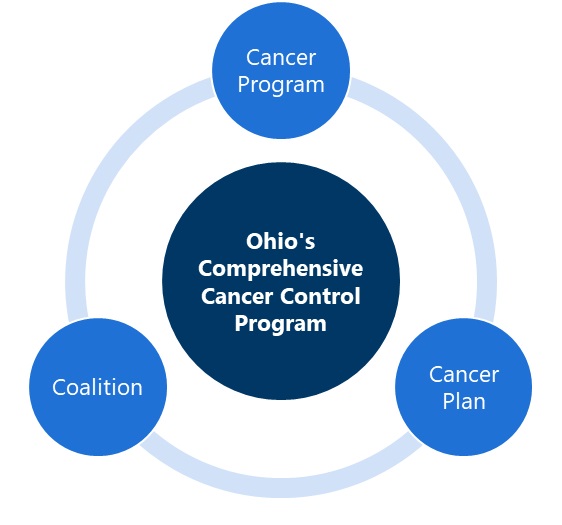Background
PDA provides process and outcomes evaluation for the Ohio Comprehensive Cancer Control Program (CCCP), which includes the Cancer Program, the Ohio Cancer Plan, and the Partnership (the coalition), the Ohio Partners for Cancer Control (OPCC). The essence of CCCP work is on facilitating partnerships, increasing coordination and reducing duplication, and creating a value added for the individuals who volunteer their time to CCCP efforts. By design, the OPCC brings together a diverse array of stakeholders working on, affected by, or interested in reducing cancer incidence, mortality, and disparities. Given the wide range of activities, types of stakeholders, and key priorities, it was a formidable challenge to create and implement a responsive yet feasible evaluation and report of the OPCC’s work!
Approach
As with most coalitions, OPCC collects information about the coalition’s processes through an annual member survey. The findings are used internally to understand the strengths and areas in need of improvement. Further, the strengths inform promotional efforts of the OPCC to recruit interested stakeholders to join the coalition. A similar survey has been done for multiple years, and there are consistently positive findings every year. Sensing the need for more in-depth information, we collaborated with ODH to include some open-ended and demographic items in the survey, so we could better understand the meaning behind the numbers. To complement and extend the survey data, we conducted interviews and took a deeper dive into the coalition’s processes. We completed a total of 12 interviews with the OPCC executive chair, committee chairs, the CCCP staff at the Ohio Department of Health, and the Ohio Department of Health’s program cancer partners.
Results
We produced a two-page summary of the coalition survey findings and intertwined related interview findings. We also produced several one-pagers based on the interview findings that served as success stories and descriptions of emerging partnerships. The one-pagers helped further showcase Ohio’s CCCP’s efforts.
In addition, our in-depth interviews allowed us to provide the following recommendations:
- Clearly communicate OPCC funding structures and parameters to membership.
- Intentionally recruit new OPCC members from Ohio regions outside the immediate Franklin County area to encourage balanced geographic representation.
- Share the 2015-2020 Cancer Plan and other Ohio Department of Health published reports more proactively and strategically with relevant stakeholders across the state.
- Create structured data collection processes to track ongoing committee progress toward Cancer Plan objectives.
- Offer ways for members to get involved beyond priority area work, including a reinstated data committee, events and conferences, and advocacy opportunities.
Our interview findings helped OPCC understand the context of the survey findings and highlighted the need for expanding OPCC membership, clarifying the resource limitations of the coalition, and coordinating the evaluation efforts across the various ODH partners, OPCC committee chairs, and internal and external evaluation efforts. We continue to incorporate interviews and this reporting style into the evaluation of the coalition as we look to engage a broader array of stakeholders in partnership with ODH.
Related Highlights
Using principles-focused evaluation to embed health equity in an initiative
PDA engaged program staff and community partners in revising and assessing program principles that reflect health equity processes and outcomes.
Evaluation to inform best practices for active transportation planning
PDA conducted a content analysis of transportation planning documents to support the implementation of active transportation components in local and regional planning processes.
Using principles-focused evaluation with a complex, multi-grantee initiative
PDA used a principles-focused evaluation framework to guide our evaluation of a statewide initiative to prevent chronic disease.
See More Highlights
Our Team
Our dedicated and talented team is united by our common desire to improve communities.

Anne Schwalbe
Senior Evaluator I

Traci Capesius
Senior Evaluator II

Emily Groebner
Senior Evaluator I

Jen Pelletier
Principal Evaluator



